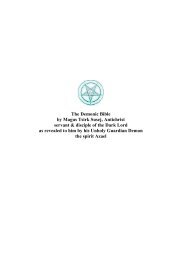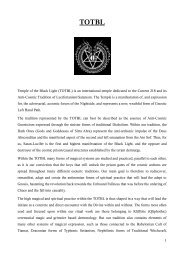Satanism Today - An Encyclopedia of Religion, Folklore and Popular ...
Satanism Today - An Encyclopedia of Religion, Folklore and Popular ...
Satanism Today - An Encyclopedia of Religion, Folklore and Popular ...
Create successful ePaper yourself
Turn your PDF publications into a flip-book with our unique Google optimized e-Paper software.
Appendix III: Satanist Survey 333<br />
which is eternal. It is divine in ways that a Christian<br />
will never know exists because it can only be spoken<br />
<strong>of</strong> within a book, but never DEFINED within a book.<br />
It is just as terrifying as it is exalting, <strong>and</strong> is usually<br />
encountered during times <strong>of</strong> great stress during<br />
which we must “evolve or die.”When we touch upon<br />
the primal, it is just as horrifying as it is beautiful.<br />
Given this impersonal view <strong>of</strong> Satan, one might well<br />
ask why one should even use the self-designation<br />
“Satanist.” LaVey asserted that it was useful to call oneself<br />
a Satanist because it shocked other people into thinking.<br />
As one respondent wrote, “There is no Satan. The word<br />
[is] used . . . only for shock value because the Christians<br />
believe there is a ‘Satan.’”<br />
Descriptions <strong>of</strong> Satan as an impersonal force tended<br />
to overlap respondents’ descriptions <strong>of</strong> how magic<br />
works. Though many described magic as operating in a<br />
purely psychological way, most indicated that magic<br />
could also involve actual forces—forces that, while<br />
physical, had not yet been grasped by science. The<br />
psychological view is well reflected in the following:<br />
“Magick is causing change in conformity to Will, therefore<br />
everyone practices magick, whether they call it<br />
magick or not. If we want something, we perform the<br />
work to get it. If we want to make more money, chanting<br />
over a c<strong>and</strong>le does nothing, but getting an education<br />
works. Chanting over a c<strong>and</strong>le may help the magician to<br />
focus, or even believe a higher power is helping him/her<br />
through school, but in itself does nothing.”<br />
Most other respondents, however, indicated that<br />
magic did something more than this to aid them in<br />
“rewriting the script <strong>of</strong> life.” Implying the existence <strong>of</strong><br />
an unknown but nevertheless nonoccult power, one<br />
respondent defined magic as “the name for anything<br />
that cannot be completely explained scientifically, but<br />
still exists. All technology was once magic”; <strong>and</strong><br />
another as, “the manipulation <strong>of</strong> the subtle forces <strong>of</strong><br />
nature that are not currently detectable to science.” One<br />
example <strong>of</strong> these forces is the ability <strong>of</strong> dogs “to predict<br />
natural catastrophes. Dogs have essentially evolved to<br />
utilize what Satanists call ‘Satan.’” One respondent<br />
identified the forces manipulated in magic with “the<br />
biochemical energies your body gives <strong>of</strong>f during the<br />
ritual.” In whatever way they conceptualize it, most<br />
modern Satanists would agree that it is “The mind set<br />
<strong>of</strong> the magician [that sets the] stage for successful<br />
magic or failure,” rather than the specific elements <strong>of</strong><br />
magical rituals.<br />
Other Issues<br />
In a follow-up questionnaire, I examined other aspects<br />
<strong>of</strong> what might be called the “Satanist stereotype,” such as<br />
the extent <strong>of</strong> Satanist participation in role-playing games<br />
(RPGs) like Dungeons <strong>and</strong> Dragons, <strong>and</strong> the Satanic<br />
appreciation for heavy metal music. (No questions were<br />
asked about “ritual abuse,” as all serious scholars have<br />
dismissed the empirical reality <strong>of</strong> this pseudo phenomenon.)<br />
What little data I have gathered on these issues<br />
thus far indicates some interest in mainstream heavy<br />
metal, but minimal interest in more extreme forms<br />
(such as the so-called “Satanic” metal music).<br />
Respondents expressed variable interest in RPGs.<br />
I also attempted to gauge awareness <strong>of</strong> a h<strong>and</strong>ful <strong>of</strong><br />
specific thinkers associated with modern <strong>Satanism</strong> for<br />
one reason or the other—Aleister Crowley, Ayn R<strong>and</strong>,<br />
Frederick Nietzsche, Charles Baudelaire, <strong>and</strong> Ragnar<br />
Redbeard. More respondents were familiar with the<br />
writings <strong>of</strong> Crowley <strong>and</strong> Nietzsche than the others, <strong>and</strong><br />
many had read Crowley. Despite the fact that LaVey<br />
described his religion as “just Ayn R<strong>and</strong>’s philosophy<br />
with ceremony <strong>and</strong> ritual added” (Ellis 2000, 180), only<br />
a h<strong>and</strong>ful <strong>of</strong> respondents were more than passingly<br />
familiar with R<strong>and</strong>.<br />
When respondents were asked about their movement’s<br />
reputation for hedonism, most respondents were<br />
only too happy to embrace this aspect <strong>of</strong> <strong>Satanism</strong>’s<br />
cultural image. Many also noted, however, that most<br />
people (including Christians) were also hedonistic, but<br />
were either hypocritical or guilt-ridden about it. As one<br />
respondent asserted, “The only difference between the<br />
Satanist <strong>and</strong> the ordinary person is that the Satanist<br />
indulges knowingly <strong>and</strong> on purpose. The ordinary<br />
person pretends they aren’t doing it, or goes to confession<br />
after doing it.”<br />
In contrast to the general agreement about the hedonism<br />
item, Satanists were split in their response to the<br />
question on animal sacrifice. None <strong>of</strong> the respondents<br />
claimed they had actually participated in such rites, <strong>and</strong><br />
most had no direct contact with people who did. Many<br />
respondents were extremely critical <strong>of</strong> the practice,<br />
asserting, for example, that “if you ever hear <strong>of</strong> a Satanic<br />
sacrifice, it’s either bulls**t, or the ‘Satanist’ deserves a<br />
good beating.” At the other end <strong>of</strong> the spectrum were<br />
certain traditional Satanists who, like Santeria practitioners,<br />
“sacrifice chickens during certain rites. The dead<br />
chickens are consumed at a feast afterward.”<br />
In recent years, the most controversial self-identified<br />
Satanists have been certain neo-Nazi, northern<br />
European Satanists who burn down Christian churches<br />
(see Moynihan <strong>and</strong> Soderlind 1998). Most other<br />
Satanists, particularly outside <strong>of</strong> continental Europe,<br />
regard these individuals negatively, although Satanists<br />
are not uniform on this point. Some respondents<br />
expressed a degree <strong>of</strong> ambivalence, as reflected in the<br />
following remarks:<br />
If they see the churches they burn down as symbols<br />
<strong>of</strong> evil <strong>and</strong> oppression, <strong>and</strong> see their burning as a<br />
symbolic liberation <strong>of</strong> the human spirit, as well as a<br />
very real damage to the resources <strong>of</strong> their enemy,<br />
then so be it. [But] Nazism is part <strong>of</strong> a sick sado-
















